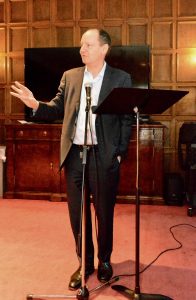- About Ramapo
- Academics
- Admissions & Aid
- Student Life
- Athletics
- Alumni
- Arts & Community
- Quick Links
- Apply
- Visit
- Give
NOTED INTERNATIONAL JURIST AND WRITER SPEAKS ABOUT THE PERSONAL ORIGINS OF THE CONCEPTS OF GENOCIDE AND CRIMES AGAINST HUMANITY
(PDF) (DOC) (JPG)June 19, 2017
MAHWAH, N.J. — Philippe Sands, QC, Professor of Law and Director of the Centre on International Courts and Tribunals at University College London and international human rights lawyer, spoke about the personal origins of the legal concepts of genocide and crimes against humanity on Wednesday, March 29 under the auspices of the Center for Holocaust and Genocide Studies.
 His recently published acclaimed book, EAST WEST STREET: On the Origins of the “Genocide” and “Crimes Against Humanity” (New York: Alfred A. Knopf, 2016) formed the basis for Professor Sands’ talk. It tells how two men, Hersch Lauterpacht and Raphael Lemkin, born within three years of each other in eastern reaches of Austrian Poland, and both students of the University of Lvov (Lemberg), independently of each other established different legal remedies to the scourge of mass killing. Whereas for Lauterpacht, who formulated the concept of “crimes against humanity,” it was all about the protecting inalienable rights of the individual; for Lemkin, who devised the concept of genocide, of crucial importance was that individuals were persecuted because they were members of a minority in need of protection. Their vying solutions to persecution based on racial, religious and ethnic hatred arose in the wake of the Holocaust and came to the fore in the 1946 Nuremberg War Crimes Trials.
His recently published acclaimed book, EAST WEST STREET: On the Origins of the “Genocide” and “Crimes Against Humanity” (New York: Alfred A. Knopf, 2016) formed the basis for Professor Sands’ talk. It tells how two men, Hersch Lauterpacht and Raphael Lemkin, born within three years of each other in eastern reaches of Austrian Poland, and both students of the University of Lvov (Lemberg), independently of each other established different legal remedies to the scourge of mass killing. Whereas for Lauterpacht, who formulated the concept of “crimes against humanity,” it was all about the protecting inalienable rights of the individual; for Lemkin, who devised the concept of genocide, of crucial importance was that individuals were persecuted because they were members of a minority in need of protection. Their vying solutions to persecution based on racial, religious and ethnic hatred arose in the wake of the Holocaust and came to the fore in the 1946 Nuremberg War Crimes Trials.
As Lauterpacht saw it, Sands explained, the danger was that Lemkin’s idea of protecting groups would create the very conditions which he was trying to prevent by potentially pitting one group against another. Moreover, it created a hierarchy of victimhood in which groups are only satisfied if an attack on their existence is legally acknowledged as genocide. Sands was at pains to point out in discussion, moreover, that, because the Genocide Convention stipulates proving intent, the charges of genocide do not always hold up in court.
A member of London’s Matrix Chambers, a practice focusing on criminal law, constitutional law and human rights with an international perspective, Sands appeared as counsel and advocate before many international courts and tribunals, including the International Court of Justice, the International Tribunal for the Law of the Sea, the European Court of Justice, the European Court of Human Rights and the International Criminal Court.
Prior to assuming his professorship at University College London, Sands held posts at St. Catherine’s College, Cambridge and the Cambridge University Research Centre for International Law (now the Lauterpacht Centre for International Law) (1984-1988), Kings College London (1988-1993) and the School of Oriental and African Studies (1993-2001). He was a Global Professor of Law at New York University Law School (1993-2003) and has held visiting positions at Paris I (Sorbonne), University of Melbourne, the Graduate Institute of International and Development Studies, Indiana University Bloomington, University of Toronto, Boston College Law School and Lviv University.
Including East West Street, that was awarded the 2016 Baillie Gifford Prize, he is the author of sixteen books on international law, including Lawless World (2005) and (2008).
Sands studied law at Corpus Christi College, Cambridge (B.A. 1982; LLM, first class honours, 1983). After completing his postgraduate studies at Cambridge, Sands spent a year as a visiting scholar at Harvard Law School.
E-News Archives
| 2023 | 2022 | 2021 | 2019 | 2018 | 2017 | 2016 | 2015 | 2014 | 2013 | 2012 | 2011 | 2010 | 2009 | 2008 | 2007 |Copyright ©2025 Ramapo College Of New Jersey. Statements And Policies. Contact Webmaster.

Follow Us!